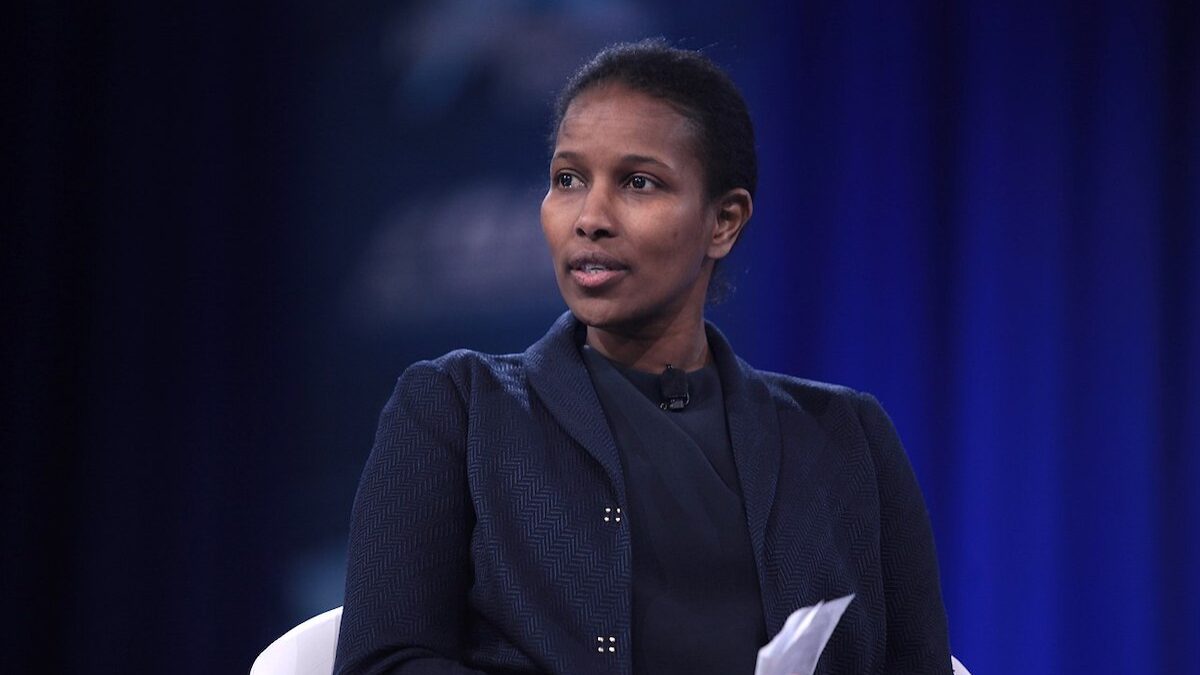Over the weekend, Ayaan Hirsi Ali revealed in an essay at Unherd that she has become a Christian. For Christians, this is welcome and joyous news. But it’s also instructive. A former Muslim who very publicly rejected Islam and became an avowed atheist in the aftermath of the 9/11 attacks, Ali has been speaking and writing in defense of Western civilization and liberal values for decades.
Now she has come to the conclusion that there is no way to maintain Western civilization and no way to preserve its liberal values apart from Christianity. Just as she came to discover the fundamentalist Islam of her youth was a dead end, she has also discovered the atheism she adopted in response to it is also a dead end.
Ali is right, of course, although the reasons she gives for her conversion might raise some eyebrows. “Part of the answer is global,” she writes. Ali says the West is under threat from three different but related forces: “the resurgence of great-power authoritarianism and expansionism in the forms of the Chinese Communist Party and Vladimir Putin’s Russia; the rise of global Islamism, which threatens to mobilise a vast population against the West; and the viral spread of woke ideology, which is eating into the moral fibre of the next generation.”
She’s also right about that but wrong to think Christianity is primarily about countering those forces or preserving a particular civilizational or political project. As great as Western civilization is, it arose as a byproduct of the Christian faith, the sole object of which is communion with Almighty God by means of salvation through Jesus Christ. Things like freedom of speech, rule of law, and human rights are fruits of the Christian faith, but they are not what Christianity is about.
Still, Ali’s conversion is instructive in an important way. As Hussein Aboubakr Mansour noted on X (formerly Twitter) over the weekend, Ali was “the poster child of what the New Atheists promised Islam.” There was a lot of discussion after 9/11 about how Islam needed its own Reformation to tame and secularize it, as Christianity had supposedly been tamed and pacified by the Protestant Reformation (never mind the century of continental war that it triggered). What the atheists promised Ali and other disillusioned Muslims was rationalism, freedom of inquiry and expression, and scientific objectivity — all of which would flourish in Muslim societies just as it had in the West, if only Muslims would set aside their backward religion and embrace the secular humanism of Western elites.
According to this theory, Christianity itself had served its purpose in the West, bestowed all its gifts, and could safely be discarded. We could live forever, drawing on its capital, which we assumed would never run out. The Islamic world needed to do likewise, and all would be well.
But something very different happened instead. It turns out, the capital was gradually spent and never replenished. Liberalism always depended for its vitality on something it cannot itself supply: the Christian faith, active and alive among the people. As the French philosopher Rémi Brague wrote back in the 1990s, “Faith produces its effects only so long as it remains faith and not calculation. We owe European civilization to people who believed in Christ, not to people who believed in Christianity.”
Ali’s conversion, which is laudable on its own (even if she doesn’t quite yet grasp the true object of her new faith), is a stark reminder that the liberal, secular West cannot survive without the Christian faith from which it emerged. Indeed, the secular elites who once promised apostate Muslims like Ali that they could have all the benefits of Christianity without Christianity itself are now abandoning the principles they once espoused.
In recent weeks, we have seen this abandonment most potently in the Red-Green alliance between the global left and the pro-Hamas crowd, who have been marching through the streets of Western cities in a show of force reminiscent of the Black Lives Matter riots of 2020. The naked antisemitism of the Hamas people, together with the deafening silence of the elites of the global left, tells you everything you need to know about the durability of secular humanism.
There is no room anymore for freedom of speech, open inquiry, or rational debate among the people and institutions that once espoused these ideals. There is only the brute force of the mob. It’s easy to see this at work throughout Western society, not just on the Israel-Hamas issue. What commitment do our elites really have to liberal totems like science and rationality, after all, when they insist that a man can become a woman, or that children can consent to castration and sterilization? When a nominee for the U.S. Supreme Court insists she cannot define what a woman is because she is not a biologist, we’ve stepped firmly into what C.S. Lewis called the void, where nothing is objectively true and all that matters is will and power.
“Unless we offer something as meaningful, I fear the erosion of our civilisation will continue,” writes Ali. “And fortunately, there is no need to look for some new-age concoction of medication and mindfulness. Christianity has it all.”
Indeed it does, and it has given us all that is good in our civilization. Having first rejected the Christian faith, however, our secular elites are now rejecting all those other good things that sprang from it, and positing a very different sort of society. Instead of a society that embraces rationality and freedom and human rights, they offer something from the pagan past: a society that embraces power and violence and domination. If we’re honest with ourselves, we can already see, on the streets of London and New York and Paris, what that society will look like.









